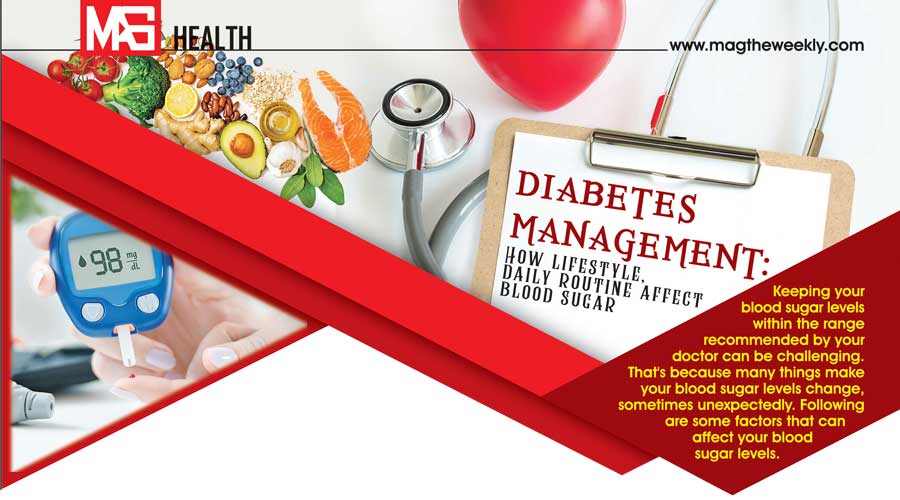Salt therapy – All you need to know
- 24 Feb - 01 Mar, 2024
Keeping your blood sugar levels within the range recommended by your doctor can be challenging. That's because many things make your blood sugar levels change, sometimes unexpectedly. Following are some factors that can affect your blood sugar levels.

Healthy eating is a cornerstone of healthy living – with or without diabetes. But if you have diabetes, you need to know how foods affect your blood sugar levels. It's not only the type of food you eat, but also how much you eat and the combinations of food types you eat.
What to do:
• Learn about carbohydrate counting and portion sizes. A key to many diabetes management plans is learning how to count carbohydrates. Carbohydrates often have the biggest impact on your blood sugar levels. For people taking mealtime insulin, it's important to know the amount of carbohydrates in your food, so you get the proper insulin dose.
• Make every meal well balanced. Plan for every meal to have a good mix of starches, fruits and vegetables, proteins, and fats. Pay attention to the types of carbohydrates you choose.
• Coordinate your meals and medications. Too little food in proportion to your diabetes medications – especially insulin – may result in dangerously low blood sugar (hypoglycemia). Too much food may cause your blood sugar level to climb too high (hyperglycemia). Inquire about how to best coordinate meal and medication schedules.
• Avoid sugar-sweetened beverages. Sugar-sweetened beverages tend to be high in calories and offer little nutrition. And because they cause blood sugar to rise quickly, it's best to avoid these types of drinks if you have diabetes.
Physical activity is another important part of your diabetes management plan. When you exercise, your muscles use sugar (glucose) for energy. Regular physical activity also helps your body use insulin more efficiently. The more strenuous your workout, the longer the effect lasts and it can also improve your blood sugar.
What to do:
• Talk to your doctor about an exercise plan. Ask your doctor about what type of exercise is appropriate for you. In general, most adults should get at least 150 minutes a week of moderate aerobic activity. Aim for about 30 minutes of moderate aerobic activity a day on most days of the week.
• Keep an exercise schedule. Talk to your doctor about the best time of day for you to exercise so that your workout routine is coordinated with your meal and medication schedules. Also, know about what blood sugar levels are appropriate for you before you begin exercise.
• Check your blood sugar level. Check your blood sugar level before, during and after exercise, especially if you take insulin or medications that lower blood sugar. Exercise can lower your blood sugar levels even up to a day later, especially if the activity is new to you, or if you're exercising at a more intense level. Be aware of warning signs of low blood sugar, such as feeling shaky, weak, tired, hungry, lightheaded, irritable, anxious or confused.
• Stay hydrated. Drink plenty of water or other fluids while exercising because dehydration can affect blood sugar levels.
• Be prepared. Always have a small snack or glucose tablets with you during exercise in case your blood sugar level drops too low. Wear a medical identification bracelet.
• Adjust your diabetes treatment plan as needed. If you take insulin, you may need to reduce your insulin dose before exercising and monitor your blood sugar closely for several hours after intense activity as sometimes delayed hypoglycemia can occur. Your doctor can advise you on appropriate changes in your medication. You may also need to adjust treatment if you've increased your exercise routine.
Insulin and other diabetes medications are designed to lower your blood sugar levels when diet and exercise alone aren't sufficient for managing diabetes. But the effectiveness of these medications depends on the timing and size of the dose. Medications you take for conditions other than diabetes also can affect your blood sugar levels.
What to do:
• Store insulin properly. Insulin that's improperly stored or past its expiration date may not be effective. Insulin is especially sensitive to extremes in temperature.
• Report problems to your doctor. If your diabetes medications cause your blood sugar level to drop too low or if it's consistently too high, the dosage or timing may need to be adjusted.
• Be cautious with new medications. If you're considering an over-the-counter medication or your doctor prescribes a new drug to treat another condition – such as high blood pressure or high cholesterol – ask your doctor or pharmacist if the medication may affect your blood sugar levels. Sometimes an alternate medication may be recommended. Always check with your doctor before taking any new over-the-counter medication, so you know how it may impact your blood sugar level.
The more you know about factors that influence your blood sugar level, the more you can anticipate fluctuations and plan accordingly. If you're having trouble keeping your blood sugar level in your target range, ask your diabetes health care team for help.
COMMENTS